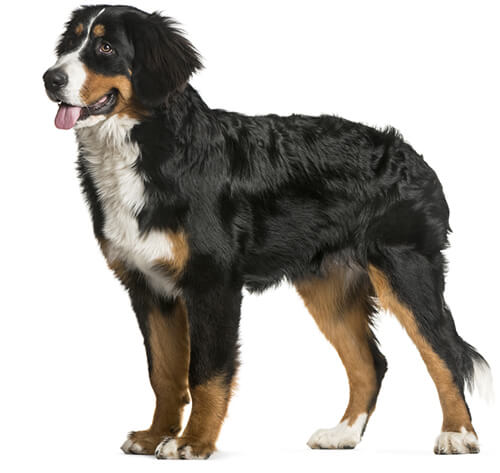
Bernese Mountain Dog
The sturdy, strong Bernese Mountain Dog originated on Swiss farms, where he worked as a drover, draft dog and guardian. The breed’s long, thick double coat protects him in cold conditions but requires frequent brushing. With his calm, confident temperament and desire to be near his family, the Bernese Mountain Dog is an ideal companion. Affectionately known as Berners, this breed requires moderate exercise.
DID YOU KNOW? One of four varieties of Swiss mountain dogs, the Bernese Mountain Dog is the second largest and the only one with a long, silky coat. By the end of the 19th century, the Bernese Mountain Dog was almost lost, but professor Albert Heim led a search for stock to preserve the breed. It was not until 1926 that Berners arrived in the U.S.
ALSO KNOWN AS: Berners, Berner Sennenhund, Bernese Cattle Dog
The need-to-know
- Dog suitable for owners with some experience
- Some training required
- Enjoys gentle walks
- Enjoys walking an hour a day
- Giant dog
- Heavy drool
- Requires grooming daily
- Non hypoallergenic breed
- Quiet dog
- Guard dog. Barks and alerts
- Great with other pets
- Great family dog
Personality

Bernese Mountain dogs are good-natured pets who love to be included in all aspects of family life, making wonderful companions. They are affectionate, patient and especially good with children, protecting them if necessary. They are social and need to be with people and given affection. They will generally bark to advise the arrival of visitors but will soon settle down again. Provided they have been introduced to cats and other household animals when young, they will live with them happily.
The Bernese Mountain Dog will suit a home-loving owner who has space for this gentle giant, likes grooming and enjoys an affectionate but not particularly active companion and doesn’t mind some canine drool.
History and Origins

The Bernese Mountain dog (or 'Berner') breed can be traced back 2,000 years to when the Romans invaded Switzerland (then known as Helvetia) with their cattle drovers and guard dogs. These Roman mastiff-type dogs were likely crossed with flock-guarding dogs who could withstand the severe weather in the Alps and also served to soften their temperaments. Bernese Mountain Dogs were often used as cart-pullers to transport woven goods or dairy products from village to village.
Nutrition and Feeding

Giant-breed dogs, as well as having giant appetites, benefit from a different balance of minerals and vitamins, supporting different joint and cartilage needs. The Bernese is also prone to bloating and stomach problems; try feeding smaller, more frequent meals to help minimise the risk.
Exercise

As puppies, exercise should be restricted to allow the bones and joints to form properly. After they are a year old, they can be allowed off the lead for free-running exercise. As adults, the Bernese Mountain Dog needs about an hour's daily exercise.
Other Information

Health and common issues
The health issue of most concern to the Bernese Mountain dog breed are the certain types of particularly aggressive cancers that they are prone to, and as such they often have a short life-span. As with many large breeds, they can also suffer hip dysplasia (a condition that can lead to mobility problems), therefore hip scoring of dogs prior to breeding is important.
Space requirements
A large country estate will do nicely! These are giant dogs who take up a lot of room and whose tails are on coffee-table height. While they don’t need a lot of exercise, they do enjoy being able to wander around outdoors so a good-sized garden will be appreciated.
Training
The Bernese Mountain Dog is a fairly easy-going dog who while a giant, doesn’t need too much training to ensure they are easy to live with. Any large breed however needs some basic training in order to be a safe and reliable member of canine society, so they should be taught all the basics including walking on a lead and a reliable recall.
Best family dog breeds
The Bernese Mountain Dog makes an ideal family dog as they love everyone. They may just be too big for smaller children and as they aren’t very portable, they’re not good for families who are always out and about as they doesn’t like being left alone. While many dogs are traditionally thought of as being good with children, all dogs and children need to be taught to get on with and respect each other, and be safe together. Even so, dogs and young children should never be left alone together and adults should supervise all interactions between them.
Did you know?
- One of their previous jobs was as a farmer’s hand as many of the local farmers couldn’t afford horses, so they would use their strong dogs to pull carts of produce to market.
- Their name refers to where they were bred: ‘Bern Canton’ – a region in central Switzerland.
- Bernese Mountain Dogs are extremely strong and can pull up to 10 times their own weight.
- They possess goofball personalities and can be a bit slower to mature than other dogs, so they retain their puppylike attitudes well into adulthood.
- Interestingly, many owners of the Bernese Mountain Dog claim that they can understand laughter and when they do something that makes their owner laugh, they’ll likely repeat it!